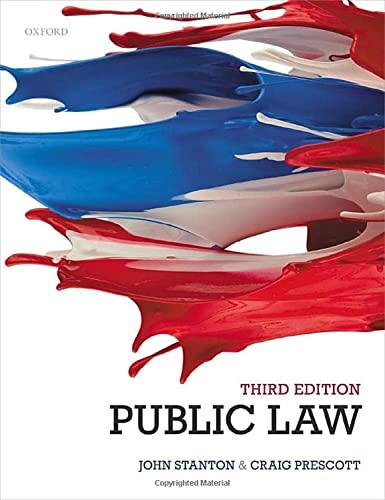Question
1. Which of the following may become the subject matter of patent application? A. Discoveries, scientific theories, and mathematical methods B. Schemes, rules, and methods
1. Which of the following may become the subject matter of patent application? A. Discoveries, scientific theories, and mathematical methods B. Schemes, rules, and methods of performing mental acts, playing games, or doing business, and programs for computers C. Methods for treatment of the human or animal body by surgery or therapy and diagnostic methods practiced on the human or animal body D. Microorganisms, non-biological process and microbiological process E. Plant varieties and animal breeds
2. X, an amateur astronomer, stumbled upon what appeared to be a massive volcanic eruption in Jupiter while peering at the planet through his telescope. The following week, X, without notes, presented a lecture on his findings before the Association of Astronomers of the Philippines. To his dismay, he later read an article in a science journal written by Y, a professional astronomer, repeating exactly what X discovered without any attribution to him. Has Y infringed on X's copyright, if any? A. No, since X did not reduce his lecture in writing or other material form. B. Yes, since the lecture is considered X's original work. C. No, since no protection extends to any discovery, even if expressed, explained, illustrated, or embodied in a work. D. Yes, since Y's article failed to make any attribution to X.
3. Samsung invented a cellular phone that can also play digital music or MP3s. It applied for the issuance of letters patent. A. The invention is not patentable because it is a combination of old functions which does not produce a new result. B. The invention is patentable because it is a new product which is beneficial to the public. C. The invention is not patentable because Samsung is a foreign corporation and it should file its application in its home country. D. The invention is patentable because it combines existing elements, a cellular phone and a digital music player, and produces a new and useful result, namely, the convenience of having two gadgets in one.
4. Alberto found that the theory of relativity of Einstein is wrong, and the correct formula is E=MC/2. He filed a patent for the same. A relative of Einstein learned of the application and went here to pray for the denial of the application. Should the application be denied? A. The application should be denied since the new formula needs to be validated by the science community B. The relative of Einstein has no personality to file the petition C. The application should be denied since the formula has no relevance to any human activity or solves any problem D. None of the above
5. How is a patent as an intellectual property or right created or protected by law? A. By invention by the inventor B. By registration with IPO C. By notarization of the invention D. By experimenting over the invention
6. X is an engineer of a multi-national company. He was able to invent while in the employ of his employer. Which of these statements relative to the patent of X's invention is true? A. X owns the patent if the inventive activity is part of his regularly assigned duties B. X owns the patent if the inventive activity is not part of his regularly assigned duties and only if he did not use the time, facilities and materials of the company C. X owns the patent if the inventive activity is not part of his regularly assigned duties and whether or not he used the time, facilities and materials of the company
D. X does not own the patent which legally belongs to his employer
7. X works as a research computer engineer with the Institute of Computer Technology, a government agency. When not busy with his work, but during office hours, he developed a software program for law firms that will allow efficient monitoring of the cases, which software program is not at all related to his work. Assuming the program is patentable, who has the right over the patent? A. X B. Institute of Computer Technology C. Neither X nor the Institute of Computer Technology can claim patent right over the invention D. X and the employer of X will jointly have the rights over the patent
8. Cherry Mobile Co. commissioned Engr. Reyes to develop a new phone. Engr. Reyes was able to develop the commissioned phone. Who owns the patent over the new phone? A. Cherry Mobile Co. B. Engr. Reyes C. Generally, Cherry Mobile Co., unless otherwise provided in the contract D. Generally, Engr. Reyes, unless otherwise provided in the contract
9. Samsung Co. employs Engr. Cruz to develop a new phone. Engr. Cruz was able to develop the phone in the course of performance of his regular duties. Who owns the patent over the new phone? A. Samsung Co. B. Engr. Cruz C. Generally, Samsung Co. unless otherwise provided in the contract D. Generally, Engr. Cruz unless otherwise provided in the contract
10. If two or more persons have made an invention separately and independently of each other, who shall own the right to the patent? A. The first person who invented the technology B. The person who filed an application for registration for such invention C. The first person who mass produced the technology D. The first person who presented the technology to a convention
Step by Step Solution
There are 3 Steps involved in it
Step: 1

Get Instant Access to Expert-Tailored Solutions
See step-by-step solutions with expert insights and AI powered tools for academic success
Step: 2

Step: 3

Ace Your Homework with AI
Get the answers you need in no time with our AI-driven, step-by-step assistance
Get Started


